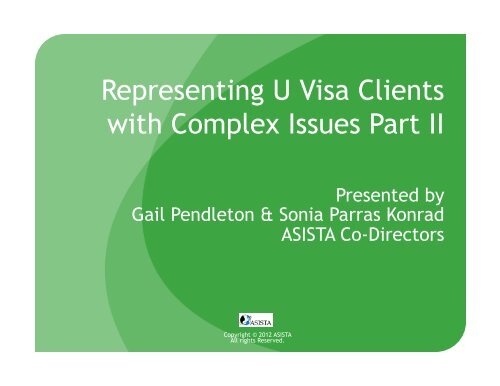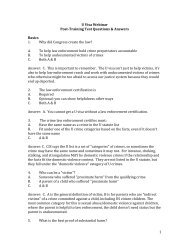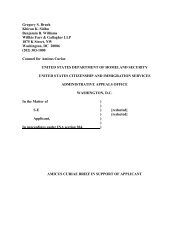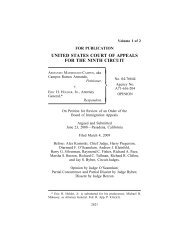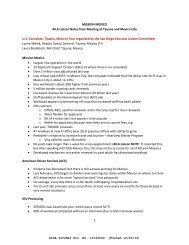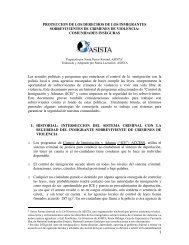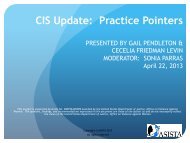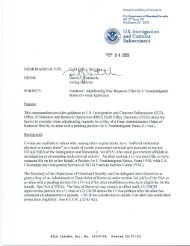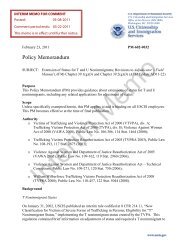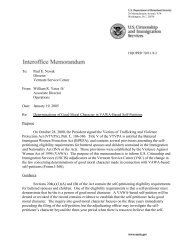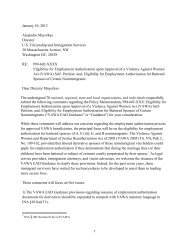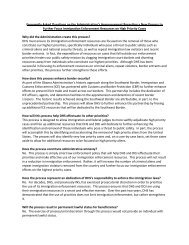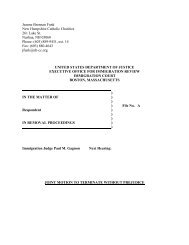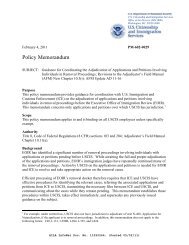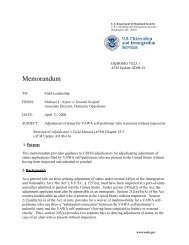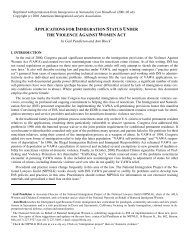Representing U Visa Clients with Complex Issues Part II - asista
Representing U Visa Clients with Complex Issues Part II - asista
Representing U Visa Clients with Complex Issues Part II - asista
Create successful ePaper yourself
Turn your PDF publications into a flip-book with our unique Google optimized e-Paper software.
<strong>Representing</strong> U <strong>Visa</strong> <strong>Clients</strong><br />
<strong>with</strong> <strong>Complex</strong> <strong>Issues</strong> <strong>Part</strong> <strong>II</strong><br />
Presented by<br />
Gail Pendleton & Sonia Parras Konrad<br />
ASISTA Co-Directors<br />
Copyright © 2012 ASISTA<br />
All rights Reserved.
Goals<br />
1. To review interviewing skills<br />
2. Improve participants representation of clients<br />
<strong>with</strong> U visa possibilities or U applications in<br />
removal proceedings<br />
(Continuation, termination, administrative<br />
closing,<br />
stays and reopening)<br />
3. Troubleshooting U visa certification issues
U <strong>Visa</strong> Remedy- Overview<br />
Purpose<br />
Requirements and eligibility<br />
How this remedy assists victims of crimes of<br />
violence
U Purpose<br />
To strengthen the ability of law enforcement to<br />
investigate and prosecute crimes listed<br />
To provide humanitarian relief to crime victims<br />
and their family members
Requirements for a U visa<br />
• Substantial physical or mental abuse from<br />
criminal activity<br />
• Possesses information concerning the criminal<br />
activity;<br />
• Law enforcement certification<br />
• Is being, has been or is likely to be helpful in<br />
the investigation or prosecution of
Rape<br />
Torture<br />
Trafficking<br />
Incest<br />
Domestic violence<br />
Sexual assault<br />
U visa Crimes
U visa Crimes Cont.
Who Can Certify<br />
Police officers<br />
Prosecutor<br />
Judge<br />
DHS Officer<br />
State or Federal Agency Employee<br />
Any agency <strong>with</strong> criminal investigative power
Interviewing Skills;<br />
Not Missing the Chance!<br />
1. Pre-interviewing<br />
1. Understand trauma and the effects it has on<br />
memory. Multiple victimization issues and<br />
triggers may invoke flashbacks or memories of<br />
past abuse.<br />
2. Be patient<br />
3. Is not personal!<br />
4. Use active listening skills
Other Considerations<br />
• Is the setting completely private<br />
• Is your interaction audible to anyone else<br />
• Are doors closed<br />
• Who is present and why<br />
• What is the purpose of your inquiries
Other Considerations Cont.<br />
• Be specific about legal remedies as it pertains to<br />
the case.<br />
• Allow for questions and expect some confusion.<br />
• Tell her confusion is normal (normalize)
Interviewing Skills (cont.)<br />
1. At the beginning of the interview<br />
1. Set clear expectations<br />
2. Explain your role and what you will try to do<br />
3. Give her time to ask questions and<br />
paraphrase your explanation/understanding
Screening Questions<br />
• Has anyone ever hurt<br />
you<br />
• Who hurt you and for<br />
how long<br />
• How old were you<br />
• Did you ever tell<br />
anyone you were<br />
being hurt<br />
• Who did you tell<br />
• Did you ever report to<br />
the police, court, the<br />
department of child<br />
protection, anyone<br />
from any agency that<br />
you were being hurt<br />
• Did anything happen<br />
after you reported<br />
• Have you ever hurt<br />
yourself How do you<br />
hurt yourself and how<br />
often
Screening Questions Cont.<br />
• Have you ever<br />
received any<br />
counseling, therapy,<br />
medical or support<br />
services as a result of<br />
someone hurting you<br />
or after you made a<br />
report<br />
• If you were hurt in<br />
your home country,<br />
did that have<br />
anything to do <strong>with</strong><br />
your decision to come<br />
to the U.S.<br />
• How would you say<br />
the victimization has<br />
affected you<br />
• Closing assessment; Is<br />
there anything else<br />
you would like to add<br />
that I might have<br />
missed or that you<br />
think is relevant
Raid at the Workplace<br />
– How many hours did<br />
you work<br />
– Where you free to<br />
decide whether to<br />
do overtime<br />
– Did you get paid for<br />
overtime<br />
– Did anything<br />
happen if you<br />
refuse to work<br />
overtime<br />
– Did you inquire into it<br />
What happened<br />
– Where you forced to<br />
buy papers, change<br />
papers to work every<br />
so often<br />
– If this happened, did<br />
you lose your benefits<br />
(seniority, vacation<br />
etc)
Raid at the Workplace Cont.<br />
– What was the<br />
average length of<br />
a shift<br />
– How many shifts<br />
did you do back to<br />
back<br />
– Where you able to<br />
take vacation/earn<br />
vacation<br />
– Where you free to<br />
leave your job If<br />
so, why didn’t you<br />
leave your job
Sexual Harassment/Assault<br />
• How did your<br />
supervisor treat you<br />
• Was any supervisor<br />
that mistreated your<br />
peers How<br />
• Did any of it ever<br />
happen to you<br />
• Did you complain<br />
about it to human<br />
resources, other<br />
supervisors or peers<br />
• Did you see<br />
supervisors or coworkers<br />
flirting <strong>with</strong><br />
your co-workers,<br />
inviting them to go<br />
out, calling them<br />
names<br />
• Did this happen to<br />
you ever Did you tell<br />
anyone about it Did<br />
anyone see it
Sexual Harassment/Assault<br />
Cont.<br />
• Did any of your<br />
supervisors/coworkers<br />
ever ask you<br />
out or offer you to go<br />
to lunch, call you<br />
outside of work,<br />
invite you to give you<br />
a ride home before or<br />
after work<br />
• What happened if you<br />
said no (potential<br />
punishment/<br />
retaliation)<br />
• Did your supervisor/<br />
co-worker ever touch<br />
you in an offensive<br />
way or in any manner<br />
• How many times did<br />
it happen Did anyone<br />
see it
Screed Everywhere and Connect to<br />
Everyone<br />
• Community clinics<br />
• Immigration detention<br />
centers<br />
• Representation of<br />
non-immigration<br />
matters<br />
• Raids<br />
• Large<br />
• Small scale<br />
(neighborhoods,<br />
trap-meetings,<br />
work, etc)<br />
• CIS/ICE/EOIR may<br />
encounter victims<br />
• At the port of entry<br />
• Between ports of<br />
entry
Screed Everywhere and Connect<br />
to Everyone<br />
• In detention<br />
• In removal<br />
proceedings<br />
• During appointments<br />
of orders of<br />
supervision<br />
• During AOS interviews<br />
• During their own<br />
investigations
Strategies for representing U visa<br />
applicants in proceedings or <strong>with</strong><br />
final orders of removal, exclusion, or<br />
deportation
Best case scenario …<br />
Persuade ICE not to file NTA- PRIMA FACIE<br />
PROCEDURE<br />
Persuade OCC-ICE not to file the NTA <strong>with</strong> EOIR<br />
Request joint motion to terminate proceedings to<br />
OCC-ICE<br />
Request motion to terminate proceedings to the<br />
EOIR<br />
Request continuance of case until approval of<br />
I-918 application
U <strong>Visa</strong> Applicants in Removal<br />
Work must happen in advance before you have an<br />
actual emergency<br />
File a skeletal application NOW!<br />
Do not forget that your client may be a<br />
derivative of a relative principal. Screen family<br />
members if no conflict
Request a Continuance<br />
Good cause shown<br />
That is why you need to file your U….<br />
Matter of Hashmi, 24 I&N Dec. 785 (BIA 2009)<br />
Set forth variety of factors to consider by EOIR
Request to Conditionally Terminate<br />
Before NTA is filed<br />
Nothing to lose!<br />
For cases that where administratively closed<br />
sleeping cases<br />
Request to re-calendar<br />
Request joint motion to terminate
Stay of Removal<br />
People subject to final order of removal are not<br />
barred from filing U visa<br />
I-246..To file or not to file…<br />
Discretionary<br />
PRIMA FACIE SYSTEM<br />
VSC hot line 802-527-4888<br />
If U visa denied, the stay is automatically lifted
Reinstatement <strong>Issues</strong><br />
No final system yet<br />
Plant the seed and argue it through the I-192<br />
waiver
Troubleshooting<br />
They do not want to sign my I-918B<br />
Non-traditional certifications<br />
Networking
Working <strong>with</strong> law enforcement:<br />
practice pointers<br />
Make contact before a real case<br />
Better to sort out priorities, confusion ahead of<br />
time<br />
Work <strong>with</strong> advocates to contact<br />
They know each other already: who is best ally<br />
They can explain victims perspective<br />
Law enforcement will trust them more than a<br />
lawyer
When You Talk to Them: Using<br />
Hypos<br />
Get "in their shoes: Examine your assumptions<br />
Identify common ground &<br />
Acknowledge differing priorities<br />
Try to understand their concerns &<br />
Be creative in meeting them
Build a Long-Term Relationship<br />
Respect & be clear on confidentiality & privilege:<br />
They do not do your (or advocates job); you<br />
do not do their job (going after perps)<br />
Formalize responsibilities: Ask for institutional<br />
commitment<br />
Do joint fundraising to cover everyones costs<br />
Create accountability = put it in writing (MOUs,<br />
protocols)
Additional <strong>Issues</strong>:<br />
Intervention issues<br />
How, When<br />
Replying to RFEs<br />
General tips<br />
Answering to “cookie cutter” RFEs<br />
Federal crimes vs. State crimes, arguments for “similar<br />
crimes”<br />
Intent to deny I-912
Continuation<br />
Appeal vs. Motion to Reconsider<br />
Motion to reconsider See 8 CFR 103.5(a)(2)<br />
Motion to reopen<br />
Appeal<br />
Strategies for when to do what<br />
When case is denied based on the I-912 denial<br />
Re-file the request<br />
212.17(b)(2) no appeal (8 CFR 103.5(a)(6)- Motion to<br />
reconsider only)
Selected Age Out issues<br />
General tips for preserving the reconsider<br />
Client notification at U closing<br />
214(p)(6) & 245(m) of INA apply to all U nonimmigrants<br />
equally and not just to principal petitioners<br />
I-539 Fees or Waiver<br />
If case “pending” when derivative age out- deferred<br />
action only in in the USA<br />
If case approved for less than 4 years<br />
no guidance yet<br />
file extension<br />
Request deferred action<br />
Appeal if needed to preserve the record
Thank you<br />
More information is available at<br />
www.<strong>asista</strong>help.org<br />
OR, contact us at questions@<strong>asista</strong>help.org


